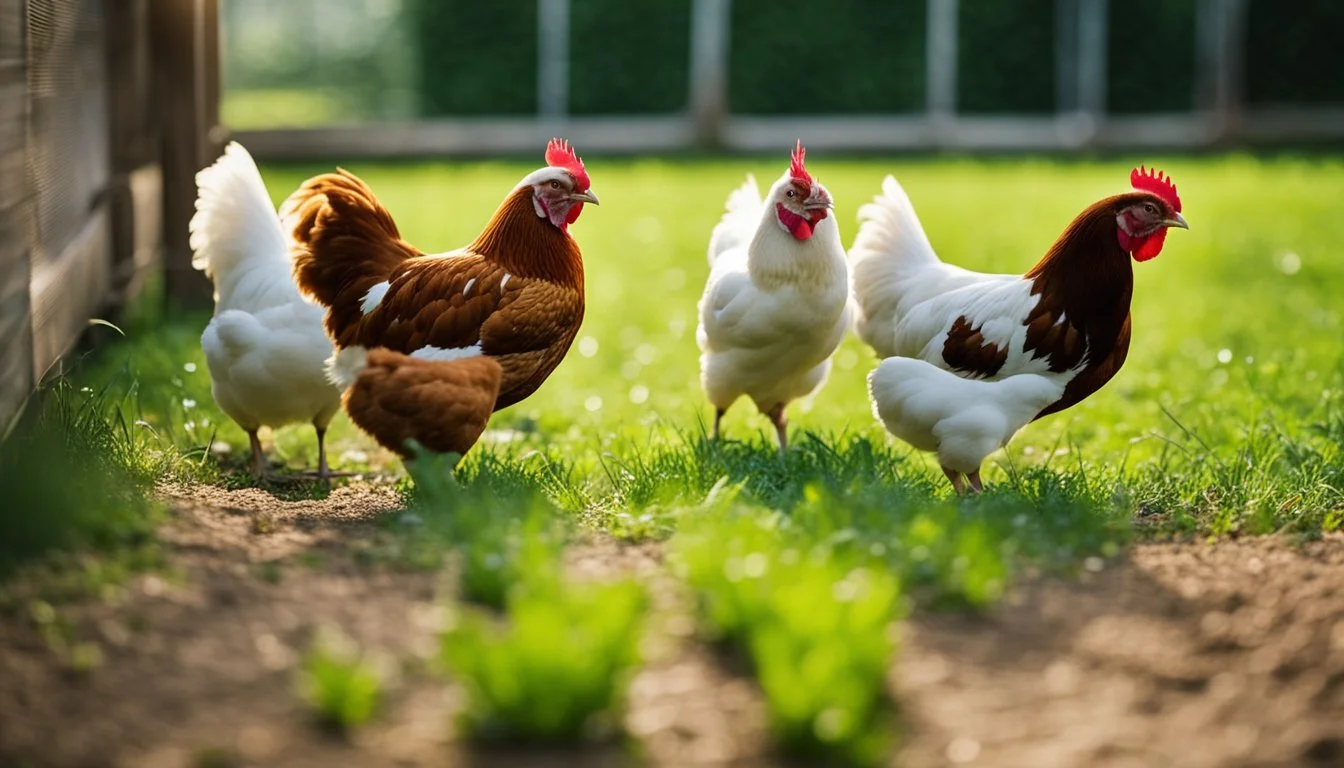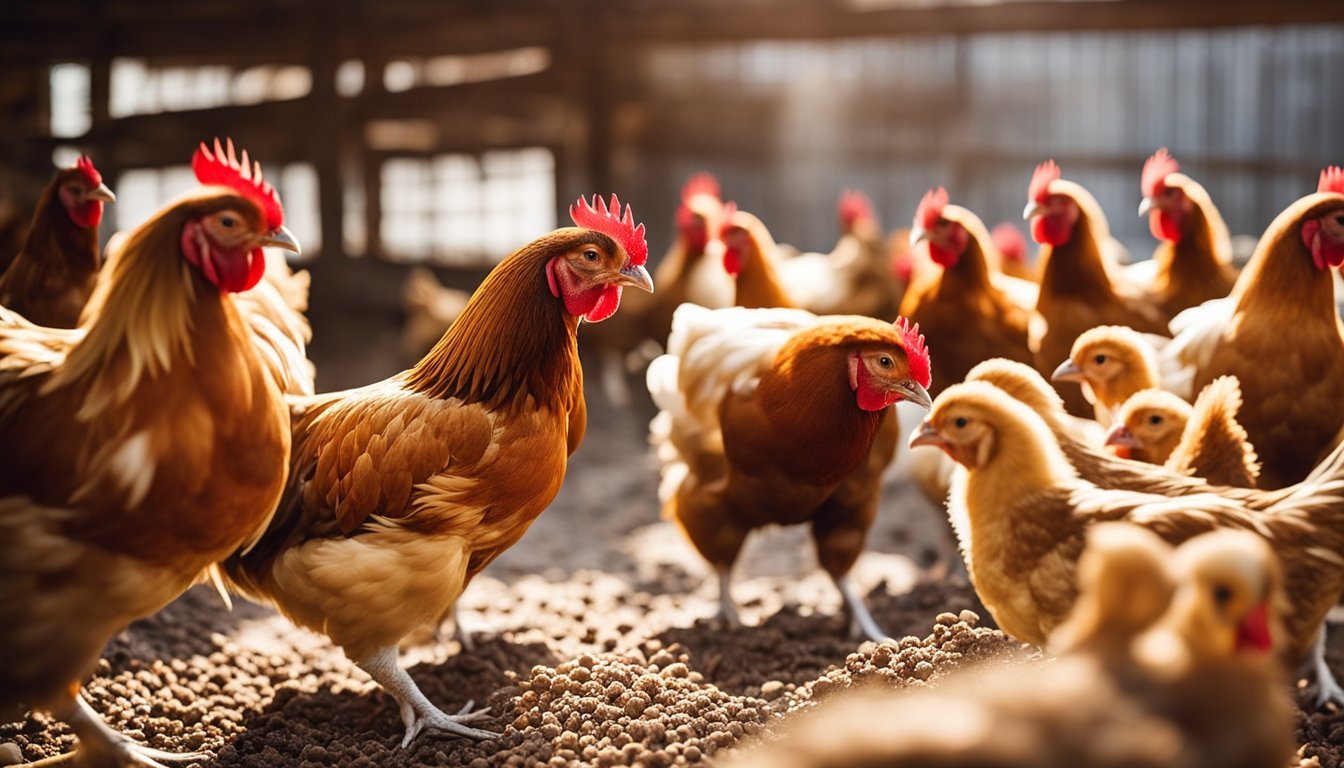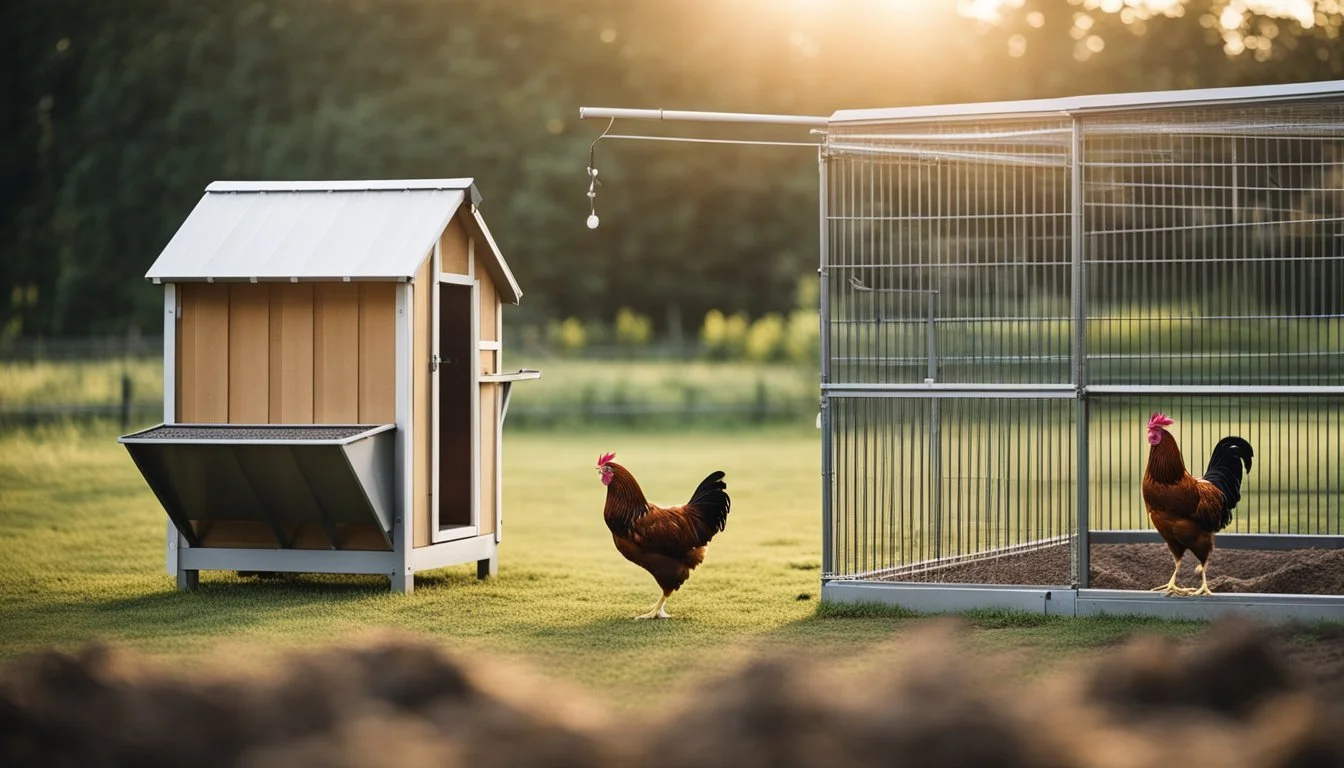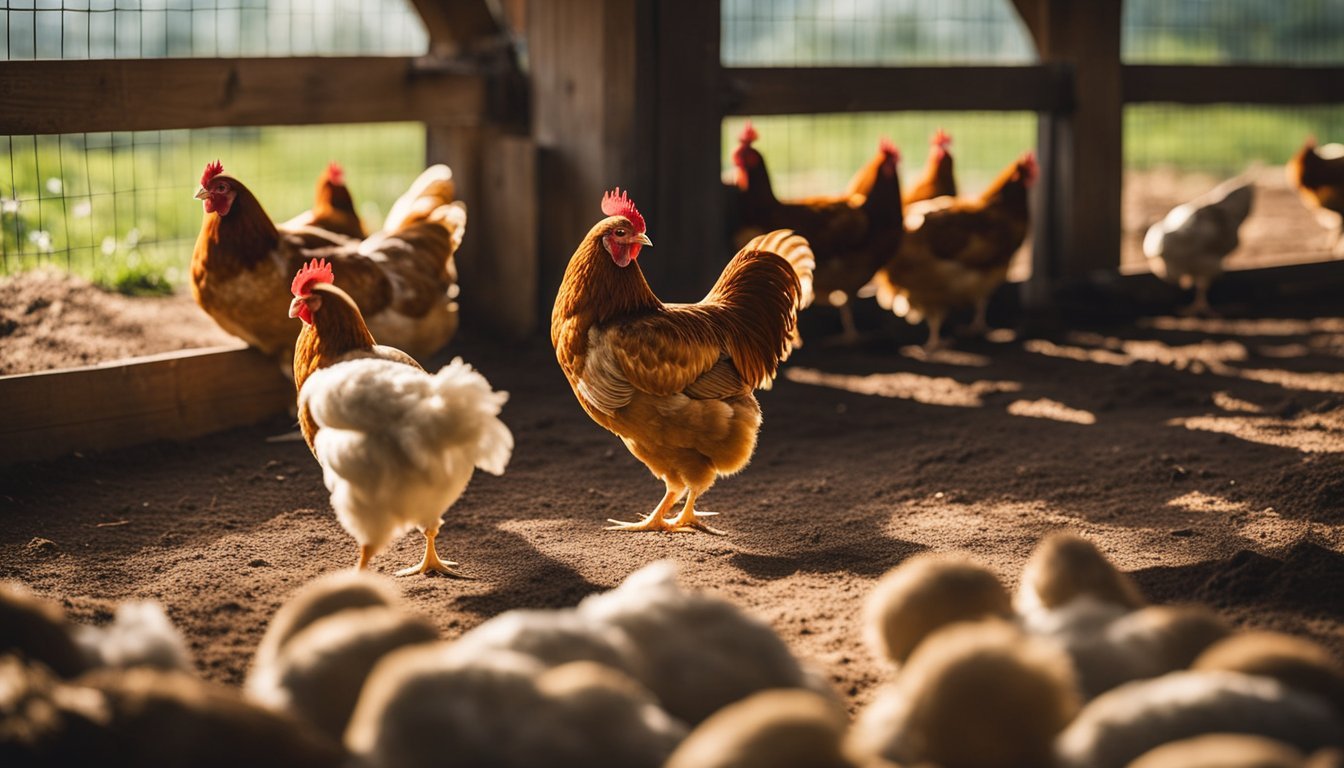5 Ways to Keep Your Chickens Healthy and Happy
Expert Tips for Optimal Care
Raising chickens can be a rewarding and enjoyable experience, whether for their eggs, their companionship, or both. Ensuring your chickens remain healthy and happy is essential for their overall well-being and productivity. By focusing on a few key areas, chicken keepers can provide a nurturing environment for their flock, leading to happier, more active birds.
Proper care includes maintaining a clean living space, providing a balanced diet, and ensuring access to clean water daily. Integrating these practices into your routine helps to ward off potential health issues and creates a positive and engaging atmosphere for your chickens.
1) Provide Clean Water Daily
Ensuring chickens have access to clean water every day is crucial for their health. Dirty water can lead to bacterial infections and other health issues. It's important to clean waterers regularly to remove dirt, algae, and other contaminants.
Using a mild detergent or poultry-safe disinfectant can effectively clean water containers. Chickens often dirty their water by stepping into it or defecating. To prevent this, consider using a contained watering system with nipples that limit contamination.
Replacing the water daily keeps it fresh and prevents the growth of harmful organisms. Adding a tablespoon of apple cider vinegar per gallon of water once a month can also help slow algae growth. Keeping the water stored in a dark container reduces the chance of algae proliferation by limiting sunlight exposure.
2) Feed a Balanced Diet with Quality Pellets
Chickens thrive on a diet that is balanced and rich in essential nutrients. Quality pellets are an excellent choice because they are formulated to meet the nutritional needs of chickens at different stages of their life.
Starter feed should have at least 18% protein for young chicks. This high-protein content supports their rapid growth and development.
Once the chickens are around six weeks old, transition them to a grower feed with 16-18% protein. This continues to support their growth until they are ready to start laying eggs.
Adult chickens need a layer feed with 16-18% protein, along with essential vitamins and minerals like calcium, to support egg production.
Pellets are beneficial because they contain a balanced mix of nutrients in each bite, ensuring consistent dietary intake. Pellets also reduce waste compared to loose grains.
In addition to pellets, chickens need clean, fresh water at all times to aid digestion and overall health. Grit can also be provided to help with digestion, especially if chickens are fed whole grains or other non-pellet foods.
3) Ensure Adequate Space for Roaming
Chickens need enough space to move around freely. At a minimum, smaller breeds require 8 square feet per bird, while larger breeds need at least 10 square feet per bird. Providing twice this amount allows chickens to run, forage, and stretch their wings comfortably.
Allowing chickens to roam outside the coop enhances their well-being. Free-ranging gives them access to fresh greens, bugs, and small rodents, which contribute to their diet and happiness. When allowing chickens to free-range, monitoring them for safety from predators is essential.
For backyard setups, a space of at least 11 feet by 10 feet can accommodate six chickens. This area includes the coop and the run. To prevent overcrowding, ensure the coop has at least 18 square feet and the run at least 90 square feet for these six birds.
Multiple entrances to the coop can help reduce bullying among chickens. They encourage more movement and usage of the outdoor space. A spacious environment prevents stress and promotes natural chicken behaviors such as pecking, scratching, and dust bathing.
Adequate space for roaming plays a crucial role in keeping chickens healthy. It allows them to exhibit their natural behaviors and reduces stress, which can impact their overall health and productivity.
4) Regular Vet Check-ups
Regular vet check-ups are essential for maintaining the health of your chickens. Just like other pets, chickens can hide signs of illness until it's too late. Routine visits to the vet help catch potential issues early.
During a check-up, a vet can perform a thorough examination. They check for common problems like parasites, respiratory issues, and signs of malnutrition. Early detection allows for timely treatment.
Vaccinations and deworming schedules should be discussed during these visits. A vet can provide the necessary vaccines to protect your flock from diseases. Deworming keeps internal parasites under control, ensuring your chickens stay healthy.
Vet visits also offer an opportunity for you to ask questions and get advice. If you're unsure about any aspect of chicken care, your vet can provide expert guidance. Their advice is invaluable for new and experienced chicken keepers alike.
5) Keep the Coop Clean and Dry
A clean and dry coop is essential for the health and happiness of chickens. Regular cleaning prevents the buildup of harmful bacteria and pests. Old bedding and droppings should be removed at least once a week.
Use a pitchfork and a broom to clean out debris and old bedding. Ensure you scrub the walls, floors, and roosting areas. A mixture of water and white vinegar can help disinfect surfaces effectively.
Avoid using sand in the bedding as it can retain moisture. Instead, replace old bedding with clean, dry materials like straw or wood shavings. This helps to maintain a dry environment inside the coop.
Incorporate a tarp on the floor of the coop to make cleaning easier. Simply remove the tarp and shake out the dirty bedding when it's cleaning time. This helps keep the floor dry and free of contaminants.
Keep ventilation in mind; ensure the coop has sufficient airflow to reduce moisture levels. Poor ventilation can lead to dampness and mold, which can harm chickens. Regular maintenance of the coop’s structure and bedding ensures a healthy living space for the flock.
Creating a Safe Environment
To keep your chickens healthy and happy, it's crucial to ensure they have a secure and protected living space. This includes building a robust coop and taking measures to shield them from predators.
Secure Coop Design
A well-designed coop is fundamental for your chickens' safety. It should be spacious enough to prevent overcrowding, which can lead to stress and disease. Each chicken needs at least 2-3 square feet inside the coop and 8-10 square feet in the outdoor run.
Ventilation is key to prevent the buildup of ammonia from droppings. Proper airflow reduces respiratory issues and keeps the environment fresh. Ensure vents are placed high to prevent drafts at the chickens' level.
The coop should be constructed with sturdy materials. Use hardware cloth instead of chicken wire, as the latter is easily breached by predators. Secure locks on all doors and windows deter unwanted intruders.
Regular maintenance, such as cleaning and inspecting for wear and tear, ensures the coop remains a safe haven for your chickens.
Protection from Predators
Chickens are vulnerable to various predators, including foxes, raccoons, and hawks. Installing a secure perimeter around the coop and run is essential. Use a buried fence, extending at least 12 inches underground, to prevent digging predators from gaining access.
Overhead protection can be provided with netting or wire to shield against aerial attacks. Ensure there are no gaps larger than half an inch.
Motion-sensor lights and alarms can deter nocturnal predators. It's also helpful to consider guard animals like dogs or geese, known for their protective instincts.
By following these measures, you can create a safe environment where your chickens can thrive.
Maintaining Proper Nutrition
Ensuring chickens receive the proper nutrition is crucial for their growth, egg production, and overall health. Key points to focus on include providing a balanced diet that caters to their specific needs and maintaining high-quality water sources.
Balanced Diet Essentials
Chickens require a diet rich in proteins, carbohydrates, fats, vitamins, and minerals.
Proteins are critical for growth and egg production. They can be sourced from mealworms, soybeans, and fish meal.
Carbohydrates supply energy for daily activities, and grains like corn, wheat, and barley are excellent sources.
Fats and oils are needed for energy and maintaining healthy feathers and skin. Vegetable oils and flaxseeds are good options.
Vitamins and minerals are equally important. For example, calcium supports eggshell formation, while vitamin A helps with vision and immune function. Supplements or a balanced feed can provide these nutrients.
Hydration and Water Quality
Water is essential for digestion, nutrient absorption, and overall health. Chickens need constant access to cool and clean water.
Regularly clean water containers to prevent bacterial growth. Use water additives that can enhance hydration and prevent disease.
During hot weather, provide fresh water multiple times a day to ensure the flock stays hydrated. Electrolytes can be added to the water to help chickens cope with heat stress.
Ensuring proper water quality involves checking for contaminants and using filtering systems if necessary. This helps in maintaining the health and productivity of the flock.
Monitoring Health and Wellness
Keeping chickens healthy involves regular checkups to spot early signs of illness and understanding common diseases that can affect the flock. This ensures prompt and effective treatment.
Regular Health Checkups
Conducting regular health checkups is essential for maintaining your chickens' well-being. Weekly or bi-weekly examinations help in early detection of issues.
Body Condition: Check for weight loss or abnormal swelling. Feathers: Look for signs of feather loss which could indicate stress or parasites. Comb and Wattles: These should be bright and firm; any discoloration or floppiness can signal health issues.
Using a checklist can be very beneficial:
Check eyes for clarity.
Inspect beak and nostrils for discharge.
Feel the crop for proper fullness.
Examine legs and feet for scaly mites or injuries.
Identifying Common Diseases
Identifying common diseases swiftly is critical to keeping your flock healthy. Some ailments can spread quickly and may require immediate action.
Marek’s Disease: Causes paralysis and tumors. Vaccination is effective. Coccidiosis: Symptoms include diarrhea and lethargy. Treatment involves medicated feed. Avian Influenza: Highly contagious respiratory illness. Look for coughing, sneezing, and ruffled feathers.
Keeping a first aid kit handy with necessary supplies like vitamin supplements, antiseptic solutions, and pain relievers can be very helpful. Maintaining proper biosecurity by limiting outside exposure and regularly cleaning the coop can prevent many infections.
These steps ensure that chickens stay healthy and free from common ailments. Regular health checks and disease identification are crucial for prompt intervention and minimizing health risks.







